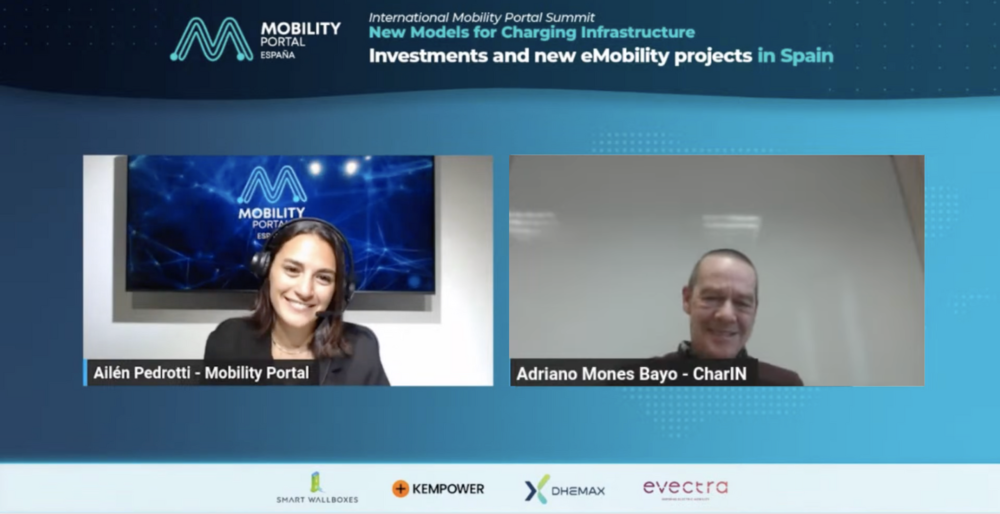“We all want to start manufacturing and installing ultra-fast connectors, but as of today, this is in a pre-industrial phase,” confirms Adriano Mones Bayo, CharIN Ambassador.
Both the industry and businesses are driving electrification and generating demand for electric trucks.
According to the European Automobile Manufacturers’ Association (ACEA), in 2023, Trucks were registered in Spain.

However, charging heavy vehicles will require high power, and availability at logistics centers and rest areas is critical at present.
In the context of the “Investments and New eMobility Projects in Spain” event, organized by Mobility Portal España, Mones Bayo states:
“If we wish to mitigate the anxiety associated with fast charging, we must manufacture trucks that do not cause stress to drivers upon arrival at the station, ensuring that the charger cable is available and ready for use.”
In this regard, it is essential to invest in existing connectors as well as a single global standard.
“We must accelerate our efforts to avoid falling behind the Chinese standard, which is technologically as advanced as ours, at least from a regulatory and standardization perspective,” he emphasizes.
Not only that, but it is also necessary to streamline the procedures for installing fast charging points, which currently take a lot of time.
At present, the national territory has over 900 publicly accessible stations with a minimum power of 150 kW and less than 250 kW, and over 600 with at least 250 kW.
According to the Business Association for the Development and Promotion of Electric Mobility (AEDIVE), in Spain, following the approval of Royal Decree-Law 5/2023, efforts have been made to facilitate the authorization process for high-capacity points.
Now, it is sufficient to submit a responsible declaration to carry out installations with a power of up to 3 MW.
However, Mones Bayo indicates that a more comprehensive approach with an integrated plan and financial support measures is necessary.
Currently, the country has two significant programs to promote this implementation.
The Perte VEC, whose third edition has recently been expanded by the Government by an additional 200 million euros, thus reaching 500 million.
Of these, 300 million will take the form of grants and 200 million of loans.
Also, 300 million euros will be allocated to a battery line to be announced in early April, and 200 million for a second line of allocation and production of models to be revealed later.
This will be added to a fourth call, scheduled for the second semester, with 1.25 billion euros in subsidies.
Regarding the Plan Moves, whose third edition ends on July 31, a fourth call is also expected to be made during this year.
“We are facing the most ambitious project not only in technological terms but also in economic and financial terms,” he states.
Therefore, while subsidies are crucial, he maintains that it is necessary to assess how they are implemented, for how long, and under what conditions, among other aspects.
An investment exceeding 10 billion euros is estimated.
Specifically for the year 2030, accumulated funding of 7 billion euros is foreseen for electric trucks in Spain.
Of these, 3.4 billion will be additional investments due to the transition from combustion to eVehicles, according to AEDIVE data.
In total, an accumulated investment of 1.4 billion euros is estimated for heavy transport charging infrastructure: 50 per cent for reinforcement and extension of the network, and 50 per cent for the installation of points.
“If we do not seek ways to be competitive, it will be very difficult to remain in the ‘Champions League’ of development and industrialization of all necessary equipment,” he emphasizes.
This is imperative for both Spain and Europe at present to comply with the Regulation for Alternative Fuel Infrastructure (AFIR).
This establishes deploying by 2030 at least 3,600 kW of charging power for heavy transport every 60 km on main roads and 1,500 kW every 100 km on European secondary roads.
“Therefore, it is crucial to consider how public subsidies can be coordinated with the efforts that the industry must make,” indicates CharIN Ambassador.
Relive Adriano Mones Bayo’s presentation during the “Investments and New eMobility Projects in Spain” event:








